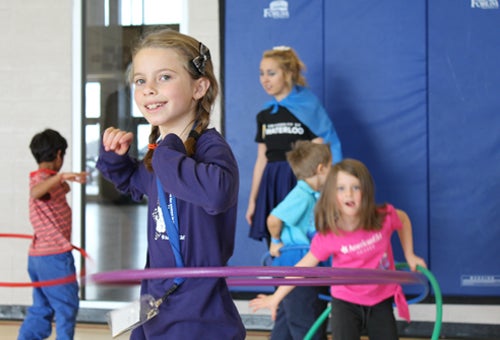
Experiential learning: Waterloo students host community event
Recreation and leisure students put textbook theory into practice at the annual Waterloo West Neighbourhood Fest

Recreation and leisure students put textbook theory into practice at the annual Waterloo West Neighbourhood Fest
By Christine Bezruki Marketing and Strategic CommunicationsWhen it comes to planning an event, liquid nitrogen and spoons don’t usually top the list of supplies — unless you are a student in Zara Rafferty’s Recreation and Leisure Studies class.
This Saturday, students in her program management and evaluation course will put their event planning — and ice cream making — skills to the test as they host a day of free family activities at the Stork Family YMCA and Harper Library.

Starting at 9 a.m., the third annual Waterloo West Neighbourhood Fest is set to include an array of children’s activities ranging from science experiments – like making liquid nitrogen ice cream – to obstacle courses and story time. Cardio Kids, a favourite of YMCA members, gives children between the ages of five and 12 a chance to get their hearts pumping through a variety of physical activities.
While the day may seem like all fun and games, for the second-year Recreation and Leisure Studies students, it marks the finale of a term-long project aimed at putting textbook theory into practice.
“For the last three years, the REC 220 course has been structured around planning, implementing, and evaluating Waterloo West Neighbourhood Fest,” says Rafferty. “There is no better way to help students make links between conceptual material than to experience it first-hand.”
The project began more than 10 weeks ago when students in Rafferty’s class conducted a needs assessment to help determine gaps in programming that currently exist in the Waterloo west neighbourhood. Based on this information, the students set about designing outcome-focused programs for Saturday’s event.
“Students had to take into account a variety of needs when it came to programming for this neighbourhood. The patrons of the YMCA and library are a diverse bunch, and students were required to consider these needs while designing engaging, age-appropriate programs that would draw families in,” says Rafferty.
After the event students will evaluate the success of their programs using a variety of strategies they learned over the course of the term and in their research design course.
But regardless of how their activities fare by evaluation standards, most students see the event as a prime opportunity to get out into the community and put their knowledge into action.
“Recreation and Leisure Studies is a hands-on field, so it’s important for us to get the practice, to push ourselves and learn our limitations. The class gave us a skill set we’ll need when we graduate, which is why the experience has so much value,” says Sharon Mair, a third-year student who took the course last year.
“Beyond teaching students about partnerships and successful programming, Waterloo West Neighbourhood Fest is a chance to connect with the community,” says Rafferty. “The take-home message from this course is that programming is not about having the biggest budget or the flashiest activities. Rather, leisure programming is about helping your participants achieve outcomes. Through this hands-on experience, students learn that not only is leisure fun, it has the capacity to unite and shape communities.”

Read more
Sport and Recreation Management student Diane Choi embarks on co-op term with the Canadian Olympic Committee

Read more
Redefining capstone learning by bringing students, faculty and community partners together to tackle real-world challenges

Read more
Here are the people and events behind some of this year’s most compelling Waterloo stories
The University of Waterloo acknowledges that much of our work takes place on the traditional territory of the Neutral, Anishinaabeg, and Haudenosaunee peoples. Our main campus is situated on the Haldimand Tract, the land granted to the Six Nations that includes six miles on each side of the Grand River. Our active work toward reconciliation takes place across our campuses through research, learning, teaching, and community building, and is co-ordinated within the Office of Indigenous Relations.